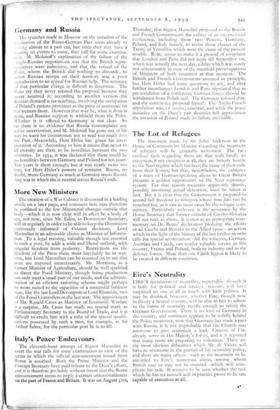Germany and Russia
The speeches made in Moscow on the occasion of the r..;ification of the Russo-German Pact seem already to !,:long almost to a past era, but since they may have a i-earing on events to come, they call for some examination. M. Molotoff's explanation of the failure of the Anglo-Russian negotiations was that the British representatives were indecisive, and that the refusal of the Poles, whom the British did nothing to dissuade, to admit Russian troops on their territory was a poor introduction to an appeal for Russian help. The accuracy of that particular charge is difficult to determine. The Poles say they never refused the proposal because they never received it; according to another version the Russian demand is far-reaching, involving the occupation of Poland's eastern provinces as the price of assistance on her western front. However that may be, what is done is done, and Russian support is withheld from the Poles. Whither it is offered to Germony is not dear. So far there is no evidence that Russia contemplates any active intervention, and M. Molotoff has gone out of his way to warn his countrymen not to read too much into the Pact. Meanwhile, Herr Hitler has given his interpretation of it. According to him if means that never to all eternity are there to be hostilities between the two countries. In 1934, it was declared that there could be no hostilities between Germany and Poland for ten years. Ten years is short enough, but it was nearly twice too long for Herr Hitler's powers of restraint. Russia, no doubt, trusts Germany as much as Germany trusts Russia. 1ny war in which she is neutral serves Russia's ends.






















 Previous page
Previous page